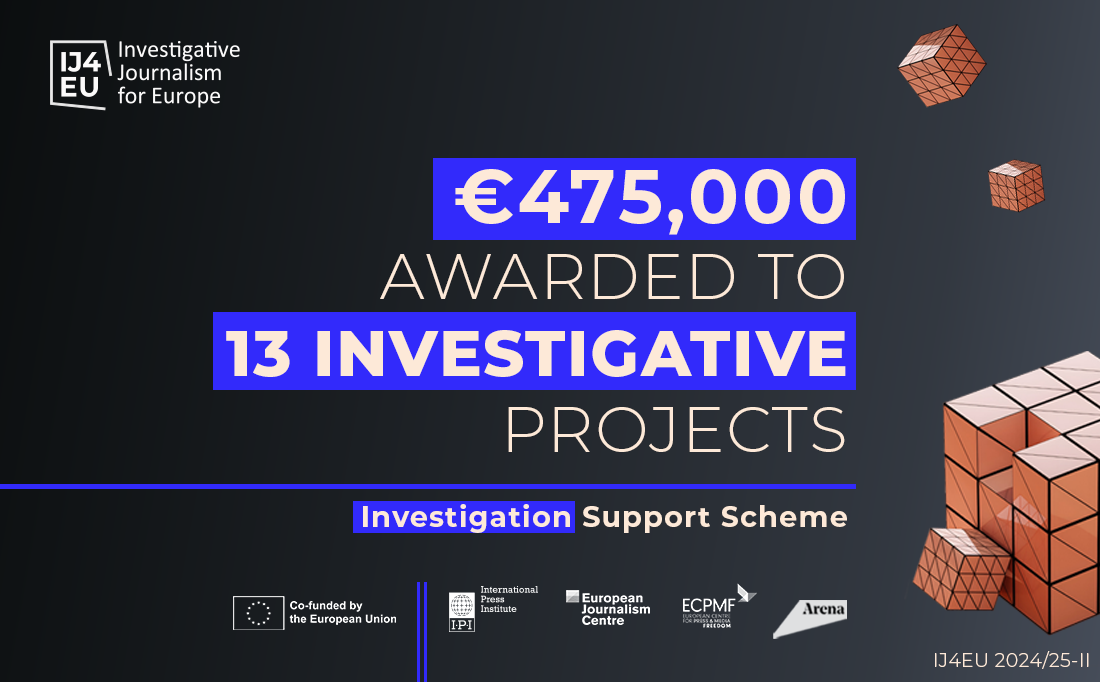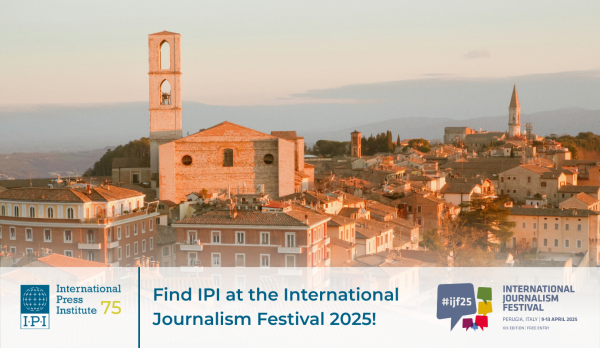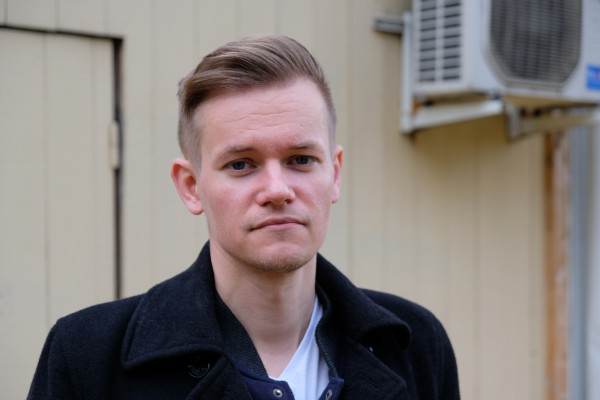Environmental threats, arms production and AI in the EU’s security apparatus are among the topics to be tackled by 13 cross-border teams awarded funding under the latest call of IPI’s flagship support scheme for investigative journalism in Europe.
From examining Europe’s preparedness for future flooding to exposing the risks posed by extractive industries to global biodiversity, investigations supported by the Investigative Journalism for Europe (IJ4EU) programme probe pressing issues that transcend national frontiers.
Other projects awarded funding under IJ4EU’s Investigation Support Scheme include exposés on the prosecution of extremists, the hidden truths behind supposedly sustainable investment funds and flaws in sexual violence laws in Europe.
An independent jury allocated a combined €475,000 to journalistic teams hailing from 39 countries – 17 EU member states, three candidate countries and nine nations further afield.
Run by IPI, the Investigation Support Scheme allows watchdog journalists to collaborate with colleagues in other countries on ambitious stories of public interest, supported by grants of up to €50,000.
The investigations
In no particular order, the successful projects are:
- An exposé of investment funds that claim to be sustainable while investing in arms makers – €43,962
- An investigation by the Environmental Investigative Forum and its partners into environmental and biodiversity threats posed by extractivist projects worldwide – €50,000
- A cross-border investigative project on preparedness for future flooding in Europe – €43,890
- A global investigation into environmental and human rights abuses linked to a European-based steel company – €29,950
- A cross-border investigation into the workings of the Czech Initiative, Europe’s latest plan to finance continued delivery of 155mm artillery shells to Ukraine – €38,695
- A collaborative, data-driven investigation by the Urban Journalism Network into the issue of housing affordability – €34,700
- A cross-border investigation into the prosecution of extremists in Europe – €49,980
- A cross-border investigation by a team of journalists from the Balkans and the EU into fraudulent financial scams – €47,620
- A cross-border investigation into the impact of AI-based tools on the evolution of the EU’s security apparatus – €35,850
- A cross-border investigation into failures of sexual violence legislation in Europe – €17,000
- A cross-border investigation led by Investigate Europe into coercive sterilisation in the EU – €18,540
- A cross-border investigation into how sanctioned associates of Belarus’s president continue to make profits in Europe – €34,988.68
- A cross-border investigation into the production, trafficking and profit laundering of amphetamines in West Asia and Europe – €29,500
Next call opens in January
The Investigation Support Scheme has a total pot of €1.5 million for the 2024/25 edition of IJ4EU. In April, the jury awarded €540,000 to 17 teams after the scheme’s first call of the edition.
That leaves almost €500,000 for a third and final call of the edition, which opens on January 13, 2025.
The Investigation Support Scheme runs in parallel to a sister IJ4EU funding and mentoring programme, the Freelancer Support Scheme, designed primarily for journalists operating outside of newsroom structures.
Results of the Freelancer Support Scheme, run by the Maastricht-based European Journalism Centre (EJC), will be announced shortly.
Editorial independence
Safeguarding editorial independence is paramount across both schemes. IJ4EU’s funding framework ensures that public and philanthropic funds bolster top-tier investigative journalism across Europe, free from any hint of editorial influence.
Ninety percent of IJ4EU’s funding comes from the European Commission, channelled through a consortium of impartial intermediary entities led by IPI.
Joining IPI and EJC in the consortium are the Leipzig-based European Centre for Press and Media Freedom, which runs IJ4EU’s annual conference and awards, and Arena for Journalism in Europe, which offers hands-on support to applicants and grantees.
Selection integrity is safeguarded by independent juries of senior editors and investigative journalism experts, creating a firewall between IJ4EU’s donors and grantees.
Since its pilot launch in 2018, IJ4EU has disbursed around €5 million in grants, fueling cross-border investigative projects that have reached tens of millions of people across Europe and beyond.
In the latest call for proposals under the Investigation Support Scheme and Freelancer Support Scheme, 176 journalist teams with journalists based in 73 countries applied for a combined €4.2 million in funding.
The five-person jury for the Investigation Support Scheme, chaired by Salvadoran journalist Carlos Dada, selected projects during a rigorous five-hour session. Criteria included newsworthiness, cross-border relevance, strong research and publication plans and robust risk management.
Check out our projects section to explore investigations previously funded by IJ4EU. Stay tuned — many stories from teams supported in the latest funding round will be published in the coming days and weeks.



